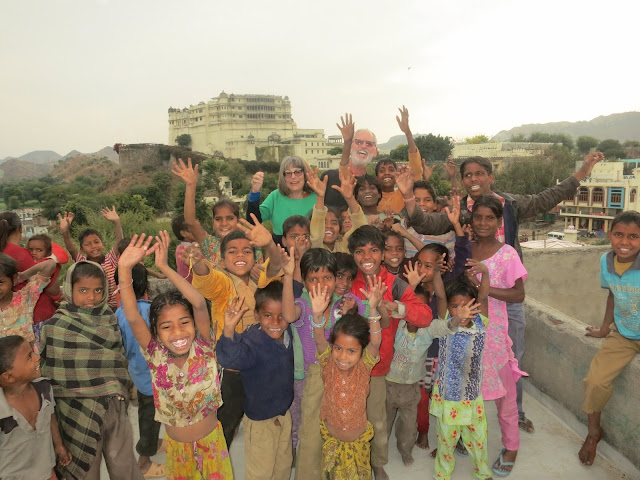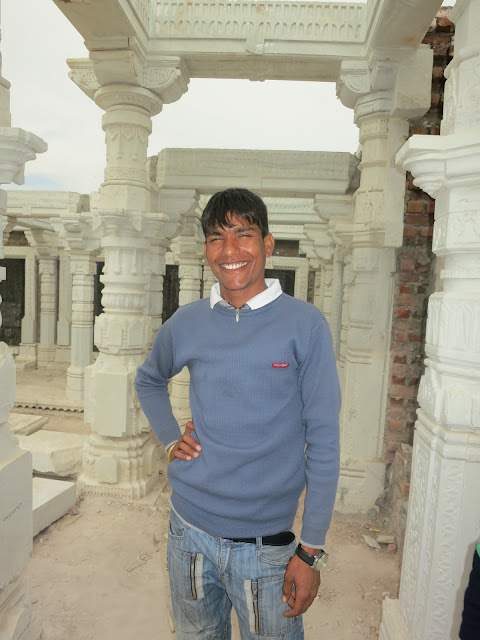 |
| Dalhi Lama |
 |
| Manil Suri |
 |
| Shashi Tharoor |
 |
| Would the Dalhi Lama Approve? |
 |
| Chicken Methe Daal and Rice |
Today was a perfect start to the Jaipur Literary Festival.
The Festival started with a keynote address by Mahasweta Devi, a famous Bangali
writer. She is quite elderly (88 years old) and revered for her social
activism.
As we went to breakfast Cathy spotted Gary Shteyngart who is
staying at our Haveli. He is one of our absolute favorite authors. If you haven’t
read “Super Sad Love Story” by him, you should! We talked to him, and he definitely
is not the nerd he portrays himself as in his novels.
We then went to a panel with a Pakistani author, who
basically defended the tribal values of honor. We both disagreed with him, but
it was interesting to hear him discuss the plight of tribes in the modern
world.
The next panel was great. We have read both of Manil Suri’s
previous books, and really like him. He is a gay writer, who is also a college
mathematics professor in the USA. He has a new book out, City of the Devi (set
in Mumbai), that he read from and talked about. The interlocutor was excellent
and it was a the best session of the morning.
The highlight of the day, was for sure seeing and hearing,
His Royal Highness the Dalhi Lama. We skipped lunch to make sure we would see
him, for there were thousands in attendance. We were in probably the 10th
row. I didn’t know what to expect, but he was questioned by Pico Iyer (who sounds like Truman Capote with a British Accent), an
author we have also read. The Dali Lama, is very funny, he laughs a lot, while
making his points. His main message was that you should question everything,
even the sayings and principals of The Buddha. If you decided that what you
believe conflicts with the dogma you are taught, go with what you think is correct, if
you are an atheist or a believer it makes no matter - it is all about personal ethics. At the end he summed up his belief by saying
essentially, if faced with an unsurmountable problem, use your intelligence to
overcome it, it you can’t overcome it, try again to figure out a solution, if
you can’t figure out a solution, just accept the problem, don’t be angry, there
is no solution. It was exceptional experience to hear him talk for over an
hour.
We then went to a session with Shashi Tharoor. There is
no-one America that is like him. He is an accomplished writer with many books.
He is a power in the Indian Government as an elected Member of Parliament and Minister in the government. He is extremely good looking and could be a movie
star, he is highly educated with a PHD and extremely eloquent. He is lady’s man
beyond belief. He has got it all! He could talk for hours about Indian
Government and history. He basically described the current political climate,
especially as it relates to Pakistan. It was amazing to hear him discuss, so
fluidly, and humorously so many critical problems. Bottom line for him, is that
International issues, need to be secondary to raising the health and welfare of
the average Indian. This is very complicated in a world where TV anchors clamor
for war with Pakistan after the beheading last week of several Indian Soldiers
by Pakistanis. It was an enlightening discussion.
We then went to a session with Javed Aktar. He is one of our
favorites, a Bollywood Screen Writer, a Poet in Urdu and leading intellectual.
The entire session was in Urdu and Hindi, and we skipped out early.
We then went to Baba our Jeweler in Jaipur. Oh how, Courtney
would love him. Basically he is manufacturer and wholesaler of jewelry. Unlike
most jewelry stores, he sells the gems, separately from the setting (gold or
silver). So you sort through all kinds of gems, and also discuss settings. He
is also a business man, and isn’t going to miss a sale. So, the sessions with
Baba go on and on. He has an apparently endless amount of stuff to show, and if
he thinks you have any capacity to buy, he doesn’t stop. It is all a good show.
We wound up spending several hours with him, before we finally extracted
ourselves. It was fun, and his jewelry is well priced. So, bottom line, if you
go to Jaipur, Baba is your man.
We have a special relationship with our driver, Vijay, we
have who is with us all week in Jaipur. We have used him
before, we feel like he is family. Most drivers get a commission from a store
when they bring you there. I asked Vee Jay if he was getting one from Baba. He
said no, because we knew about Baba, he didn’t, we went to Baba based upon a
recommendation of a friend in Silverlake. When I found out he wasn’t getting
anything from Baba, I told him I would make sure he would and will talk to Baba
about it tomorrow when we pick up Cathy’s emerald ring. I am sure I can help
him.
































.jpg)






